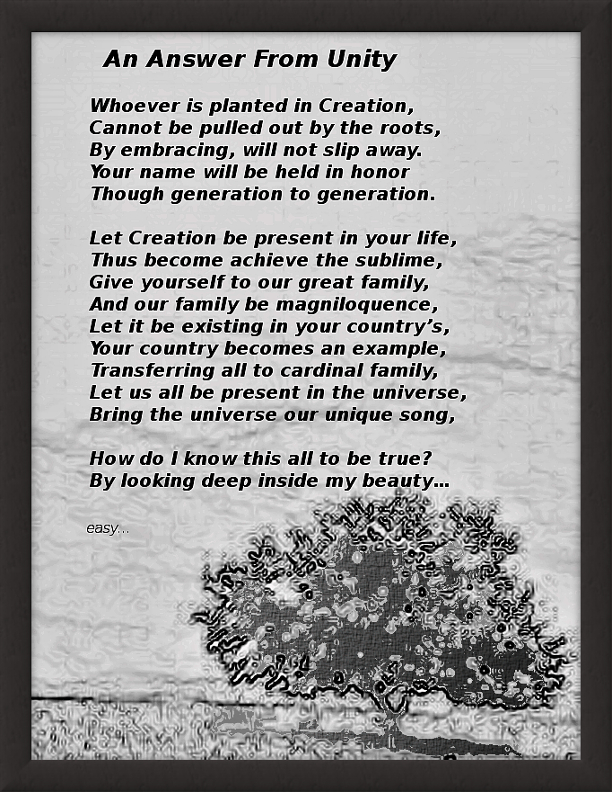In the evolving discourse surrounding the Bahá’í Faith, the concept of unity emerges as a cornerstone of its teachings. What does unity truly mean in this context? This question, deceptively simple, invites a profound examination of our individual and collective existence. The challenges of interpreting unity lie not only in its philosophical implications but also in the practicalities of human relationships and societal structures. As we delve into the Bahá’í perspective on unity, we uncover layers of meaning that resonate deeply within the human experience.
At its essence, unity within the Bahá’í framework is often articulated as the oneness of humanity. This notion posits that despite the myriad diversities—be it in culture, religion, or ideology—there exists an underlying thread that binds all human beings together. But how does one reconcile the stark differences that characterize our world with this grand ideal of unity? This presents a potential challenge: if unity is inherent, why do conflicts persist?
The Bahá’í teachings suggest that unity does not imply uniformity. In fact, it embraces diversity as a vital aspect of the human condition. According to Bahá’í principles, the world is enriched by its differences; these differences should not be perceived as barriers but rather as a tapestry woven together by shared human attributes. Still, one must inquire—how do we celebrate diversity while fostering an environment of unity?
The answer lies in a transformative understanding of love and compassion. At the heart of Bahá’í teachings is the concept that true love fosters unity. Love, as described within this framework, transcends superficial differences and engenders an atmosphere where empathy and understanding flourish. The challenge arises in a world where love is often eclipsed by prejudice and misunderstanding. Thus, Bahá’ís are called to actively cultivate a spirit of love as a foundational precept in their lives.
A critical component of Bahá’í unity is the importance of dialogue. Open and respectful communication is essential in breaking down barriers and departing from entrenched positions. Engaging in meaningful dialogue not only facilitates understanding but also encourages collective problem-solving. This raises another question: how can individuals who hold divergent views engage constructively? Bahá’í teachings underscore the importance of approaching discussions with humility and a willingness to listen, thus creating a fertile ground for unity.
Moreover, the concept of global citizenship is intrinsically connected to the Bahá’í view of unity. The embrace of global citizenship entails recognizing that one’s responsibilities extend beyond the local community to encompass the broader world. This perspective compels individuals to act in ways that promote the welfare of humanity as a whole. It poses a challenge: in an age characterized by nationalism and isolationism, how can Bahá’ís localize global theatre and enact change? By fostering a vision of interdependence, Bahá’ís can engage actively in social progress.
In exploring the practical manifestations of unity, the Bahá’í community strives to implement tenets of equality, particularly gender equality, as a means to foster a unified society. The teachings assert that the advancement of women is crucial for achieving a harmonious world. This prompts another reflective question: why is gender equality integral to unity? The answer lies in the recognition that societies flourish when all members can contribute fully. The challenge here is combating deeply ingrained societal norms that hinder equality and negotiating paths toward empowerment.
The Bahá’í understanding of unity also encapsulates the concept of service to humanity. Integral to this is the notion that individuals find purpose and fulfillment through acts of service. This creates a cycle where the act of serving others enriches both the giver and the receiver, cultivating a profound sense of interconnectedness. Yet, one might ask, how can we encourage a culture of service in a world often preoccupied with self-interest? The Bahá’í teachings promote the idea that by recognizing the intrinsic nobility of all beings, motivation toward acts of service naturally arises.
As we navigate the journey toward understanding unity, it is imperative to recognize that the pathway is neither linear nor devoid of challenges. Tension may surface in various forms—cultural clashes, ideological differences, or even personal grievances. The Bahá’í perspective encourages the use of patience and perseverance to surmount these difficulties. In this context, how does one remain steadfast when faced with adversity? The teachings advocate for a reliance on spiritual principles and a deep connection with God, which serves as an anchor amidst life’s turbulence. This spiritual grounding equips individuals to rise above personal and collective trials.
In conclusion, the Bahá’í teachings embody a rich tapestry of insights concerning unity, urging individuals to embrace diversity, engage in meaningful dialogue, promote equality, and serve humanity. What does unity really mean? It transcends mere coexistence; it embodies a profound commitment to the collective well-being of humanity. The challenges presented in realizing this ideal are significant yet navigable through faith-driven action and a heart ablaze with love. Ultimately, unity, as envisioned in the Bahá’í faith, invites everyone to partake actively in the unfurling of a new world—one characterized by peace, equity, and lasting harmony.
